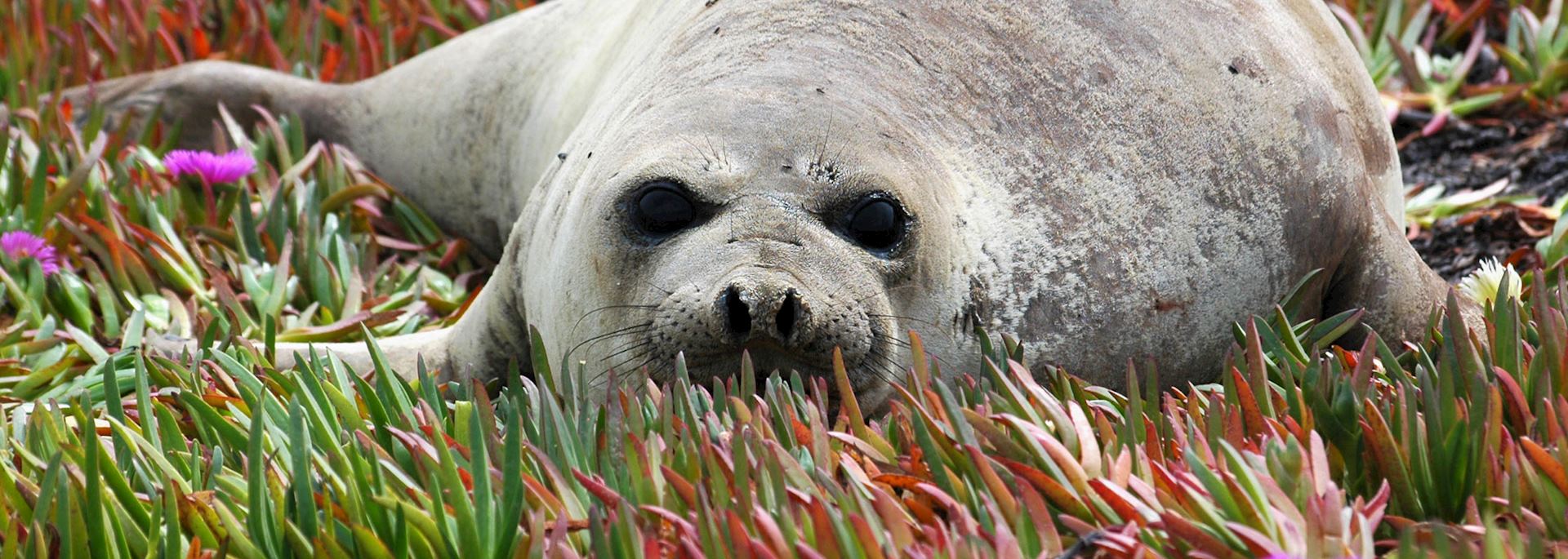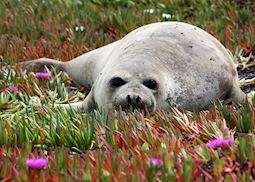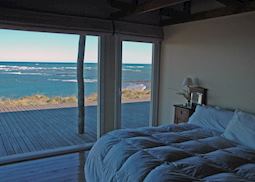Jump to:
A wild and treeless tag of land, loosely linked to the Argentinian mainland and reaching out into the South Atlantic, the Península Valdés is a UNESCO-registered nature reserve that’s home to a large variety of species. It’s of special appeal to anyone interested in marine wildlife, particularly whales, which throng here in the austral winter (the Northern Hemisphere’s summer).
With 400 km (249 miles) of shoreline, the peninsula is an untamed mass of coastal lagoons, mudflats, sandy and pebble beaches, sand dunes and wetlands. The latter form important nesting sites for migratory seabirds, while the beaches can be busy with southern elephant seals and southern sea lions.
A four-hour drive south of the peninsula, things get wilder still. Bahía Bustamante and the Peninsula Gravina cosset an isolated and near-immaculate ecosystem. Here, petrified forests sit alongside a desert-like coastline and shell-strewn beaches, while offshore islands house thriving populations of Magellanic penguins.
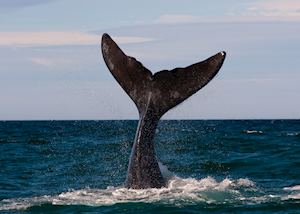 You’ll explore both these areas with guides on safari-style expeditions. Due to the scant human population, the wildlife here is fearless, sometimes venturing quite close to you: a feature that often earns the region comparisons with the Galapagos Islands.
You’ll explore both these areas with guides on safari-style expeditions. Due to the scant human population, the wildlife here is fearless, sometimes venturing quite close to you: a feature that often earns the region comparisons with the Galapagos Islands.
On the Península Valdés, guanacos, rheas and armadillos roam the land, while orcas and southern right whales come to breed offshore. At Punta Tombo, you’ll find a noisy colony of Magellanic penguins, indigenous to the area.
You can stay on the isthmus itself, or base yourself in the town of Puerto Madryn, which in 1865 was the site of the first Welsh landing in the area. The legacy of those settlers remains today in the form of Welsh-speakers, tea rooms and Eisteddfods (competitive festivals of music and poetry).
Journeying south over dirt roads (roughly a three-hour drive from Trelew Airport), you come to the private reserve of Bahía Bustamante. There’s a profusion of wildlife almost straight away: just driving through the reserve you’re likely to see rabbits, Maras sheep, gray foxes and guanacos.
Moving between pastureland, desert terrain and gorges, Bahía Bustamante is topographically volatile. It spills into a splintered coastline of capes, bays and headlands bright with green algae and nutrient-rich waters.
A private reserve that welcomes only 18 or so guests at a time, Bahía Bustamante started off life as a seaweed factory and workers’ village. Since then, the factory owners’ descendants have turned it into a wildlife reserve-come-retreat — though farming and seaweed processing still remains the area’s main source of income. The whole place has an undiscovered, end-of-the-world feel.
There’s a lot to see here, both in the lodge’s private lands, on nearby Peninsula Gravina, and on tiny islands (only accessible through Bahía Bustamante Lodge). You can walk on beaches strewn with whale fossils and littered with the discarded remains of shellfish once consumed by the indigenous Mapuche people.
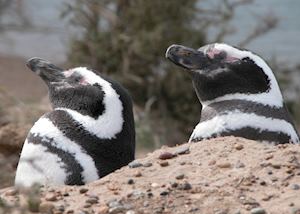 Offshore, you can visit more Magellanic penguin colonies (they can be 100,000 penguins strong) and the Vernaci Islands, which are brimming with birdlife: we’ve counted giant petrels, steamer ducks, caracaras, ibis and oystercatchers.
Offshore, you can visit more Magellanic penguin colonies (they can be 100,000 penguins strong) and the Vernaci Islands, which are brimming with birdlife: we’ve counted giant petrels, steamer ducks, caracaras, ibis and oystercatchers.
Back on land, a petrified forest contains rocks with bubble formations (originally from Africa, when the continents were joined) and a petrified trunk still bearing the marks of the velociraptor that clawed at it. A rock canyon, sheltered from the merciless Patagonian wind, shelters rare grey-horned owls.
You’re not limited to exploring via safari, either: you can also ride the property’s lands with its resident gauchos.
Nor is Bahía Bustamante Lodge the only place to stay. Estancia Rincón Chico is an upmarket alternative, if you’re looking for an extra level of comfort, and its owners are exceptional hosts.
Best time to visit Península Valdés
You can spot southern right whales during their breeding season between June and December, while orcas can be seen from November through to April. August to October is the best time to observe elephant seals on the Península Valdés.
Penguin-wise, the first fluffy chicks appear from November and take to the water (de-fluffed) from January. Towards the end of March and into April, the penguin population begins to ready for its migration north to Brazil.
If you time your visit between November and April, you should be able to see most species. If you’re serious about seeing whales, though, the very best sightings occur in the austral winter (June, July and August), closer to Puerto Madryn.
This being Patagonia, the weather can be unpredictable whenever you go.
who's been there

Start planning your tailor-made trip to PenĂnsula ValdĂ©s by contacting one of our Argentina specialists
-
617-223-4521617-223-4930
- Make an inquiry
Places near PenĂnsula ValdĂ©s
- Puerto Madryn 60 miles away
Photos of PenĂnsula ValdĂ©s
Our expert guides to exploring PenĂnsula ValdĂ©s
Written by our specialists from their own experiences of visiting PenĂnsula ValdĂ©s, these guides will help you make the most of your time there. We share both our practical recommendations and the best ways to appreciate PenĂnsula ValdĂ©s at its best.
-
Argentina’s wildlife: where to go and what to see ![Elephant seal, PenĂnsula ValdĂ©s]()
Argentina’s wildlife: where to go and what to see
Argentina’s wildlife: where to go and what to see
From whale spotting off the shores of Peninsula Valdés to the second largest wetland in South America: Argentina specialist Nick guides you through Argentina’s unsung wildlife hubs, explaining where you can spot penguins, capybaras, guanacos, rheas, and much more.
Read this guide
Accommodation choices for PenĂnsula ValdĂ©s
We've selected a range of accommodation options for when you visit PenĂnsula ValdĂ©s. Our choices usually come recommended for their character, facilities and service or location. Our specialists always aim to suggest properties that match your preferences.
-
![Casa de los Acantilados (not the main house), Estancia Rincon Chico, Peninsula Valdes]()
Estancia RincĂłn Chico
PenĂnsula ValdĂ©s
Ideas for experiencing PenĂnsula ValdĂ©s
Our specialists seek out authentic ways to get to know the places that could feature in your trip. These activities reflect some of the experiences they've most enjoyed while visiting PenĂnsula ValdĂ©s, and which use the best local guides.
-
Whale Watching in the Valdes Peninsula ![Southern right whale, PenĂnsula ValdĂ©s]()
Whale Watching in the Valdes Peninsula
Whale Watching in the Valdes Peninsula
Each year from June to November the southern right whales pass the Valdes Peninsula offering spectacular opportunities to get close to these giants.
View details
